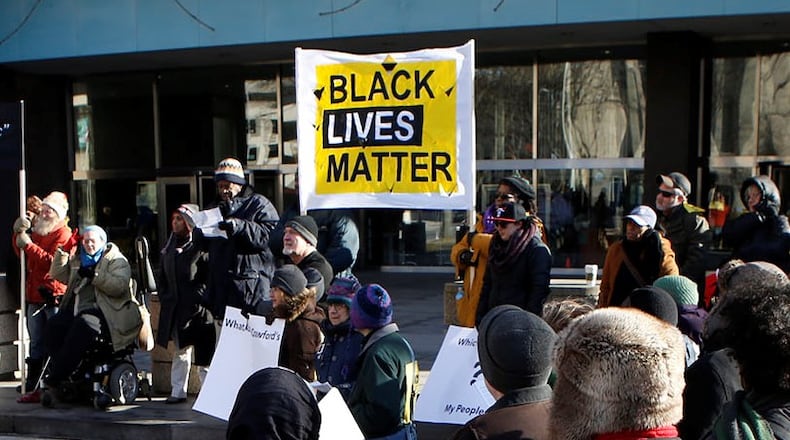The city’s website included a posting dated June 5 that outlined a more specific training program for 2020 than Oakwood has had in previous years, including “de-escalation for law enforcement.”
A key reason for the rally is increasing “awareness for the need to have inclusivity in the Oakwood community,” said Sarah Filipiak, an Oakwood event organizer.
RELATED: Dayton protests: Worried by violence; hopeful for change
The main focus “is to bring together a group of allies in our city and surrounding cities to engage and educate for action in support of the BLM movement,” Filipiak said in an email. “It is so important to show that our city is ready and willing to stand beside our brothers and sisters to fight for equal rights for all.”
She said Tuesday morning event organizers had reached out to BLM Miami Valley, but at that time had not heard back.
The rally follows several nationwide and Dayton-area protests and events in the wake of the death of George Floyd, a Minneapolis, Minn. man who died in police custody May 25.
Police Officer Derek Chauvin was fired after a video surfaced showing him kneeling on Floyd’s neck for several minutes just before his death.
POPULAR: Historic downtown landmarks, businesses damaged in protest unrest
Chauvin faces second-degree murder charges and related counts. Three other officers at the scene were also fired.
Oakwood officials met Tuesday morning with event organizers, said city Public Safety Chief Alan Hill. Wright Memorial Public Library on Far Hills Avenue is the organizers’ preferred site, “but that is going to limit them on space/capacity,” Hill said in an email.
Filipiak said around 350 people – including non-Oakwood residents - have said “they are interested or are definitely coming.”
The event comes several months after a report which indicated the city’s safety department stops and tickets black drivers at a much higher percentage than they represent in Oakwood.
EARLIER: Dayton area church leaders: Protestors’ voices not being heard
Advocates for Basic Legal Equality (ABLE), a nonprofit law firm that represents low-income individuals and groups in western Ohio, and a University of Dayton criminal justice professor released the report in late 2019.
It said traffic-ticket data in Oakwood shows that black drivers in that city accounted for nearly 22 percent of the stops where a problem with driving or equipment was observed. However, they accounted for nearly 37 percent of stops where a license plate check was run without tickets being written for an observable driving or equipment problem.
Oakwood’s black population is less than 1 percent and its total non-white population is less than 7 percent, according to U.S. Census Bureau data.
In December, Oakwood Mayor Bill Duncan said in response to the ABLE report that the city “has a long history of placing a strong emphasis on traffic enforcement. This has been the case for decades and will continue. It is a cornerstone of our public safety department’s policing philosophy a plays a key role in reducing crime.”
RELATED: Oakwood preparing response to report alleging racial profiling
When contacted Tuesday about what action the city has taken to address the ABLE report’s findings, City Manager Norbert Klopsch referred to Oakwood’s website.
Oakwood safety personnel “complete an extensive training program. The training program involves numerous topics, and regularly includes courses on cultural diversity and implicit bias,” according to the city website.
This year, that has included training on: Racial profiling for traffic stops and field contacts; cultural diversity; and de-escalation for law enforcement.
The website indicates eight hours of training in each 2015 and 2016 on topics that included: improving community trust; overcoming implicit biases; and countering implicit biases. Each of those years included eight hours training.
Sessions in 2019 included 4.5 hours training and 3.5 hours is listed for the four sessions so far this year, city records show.
About the Author

